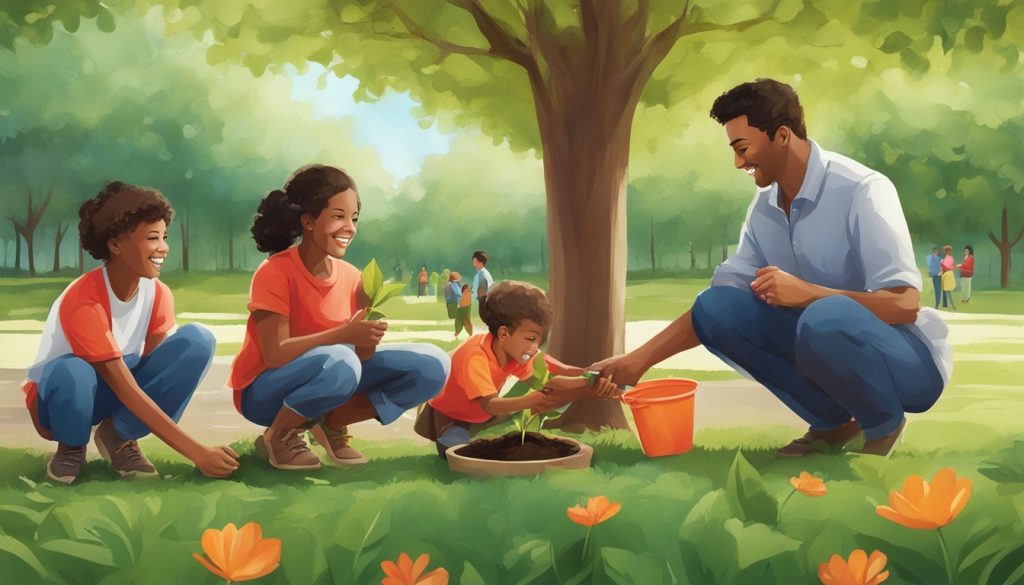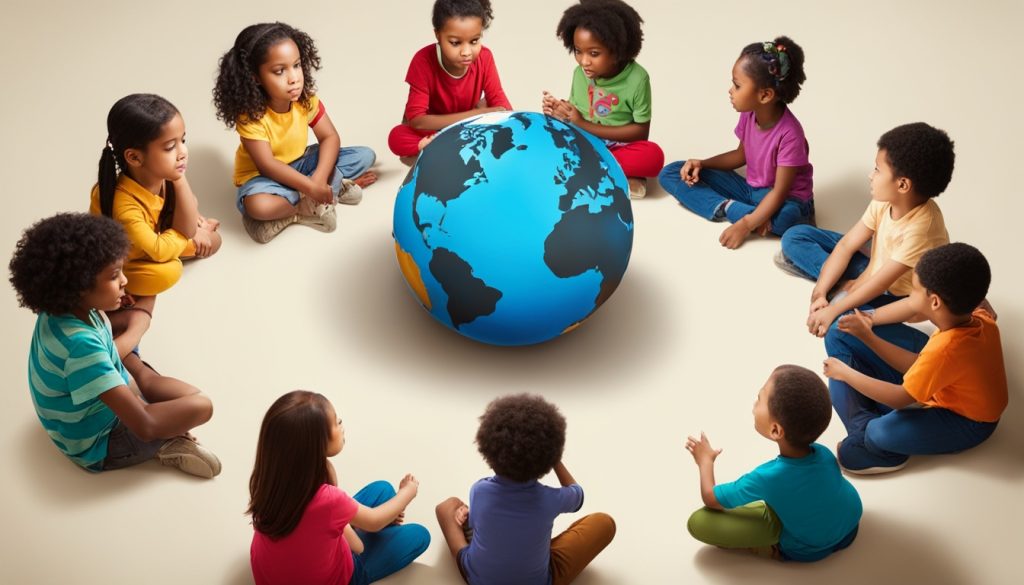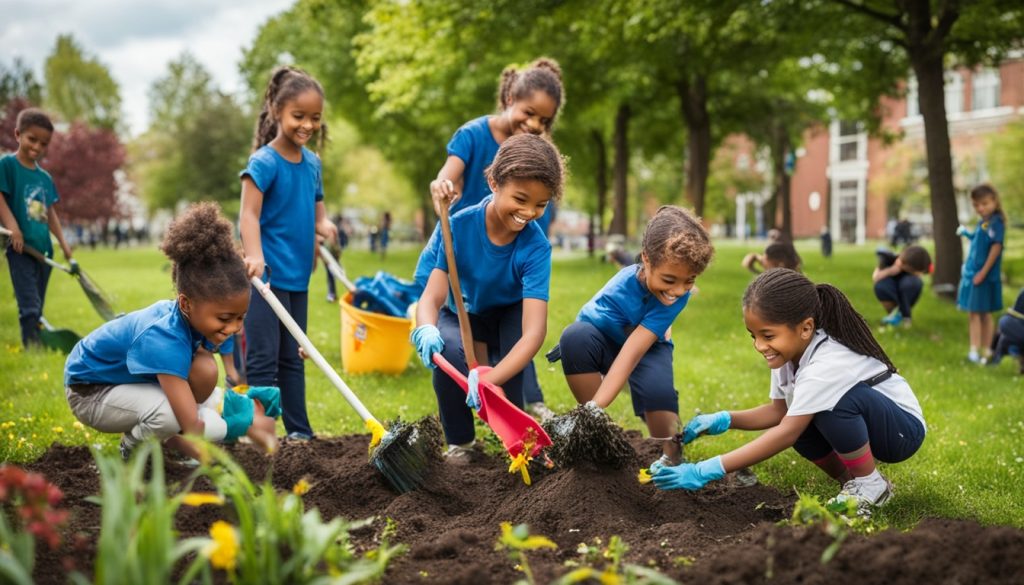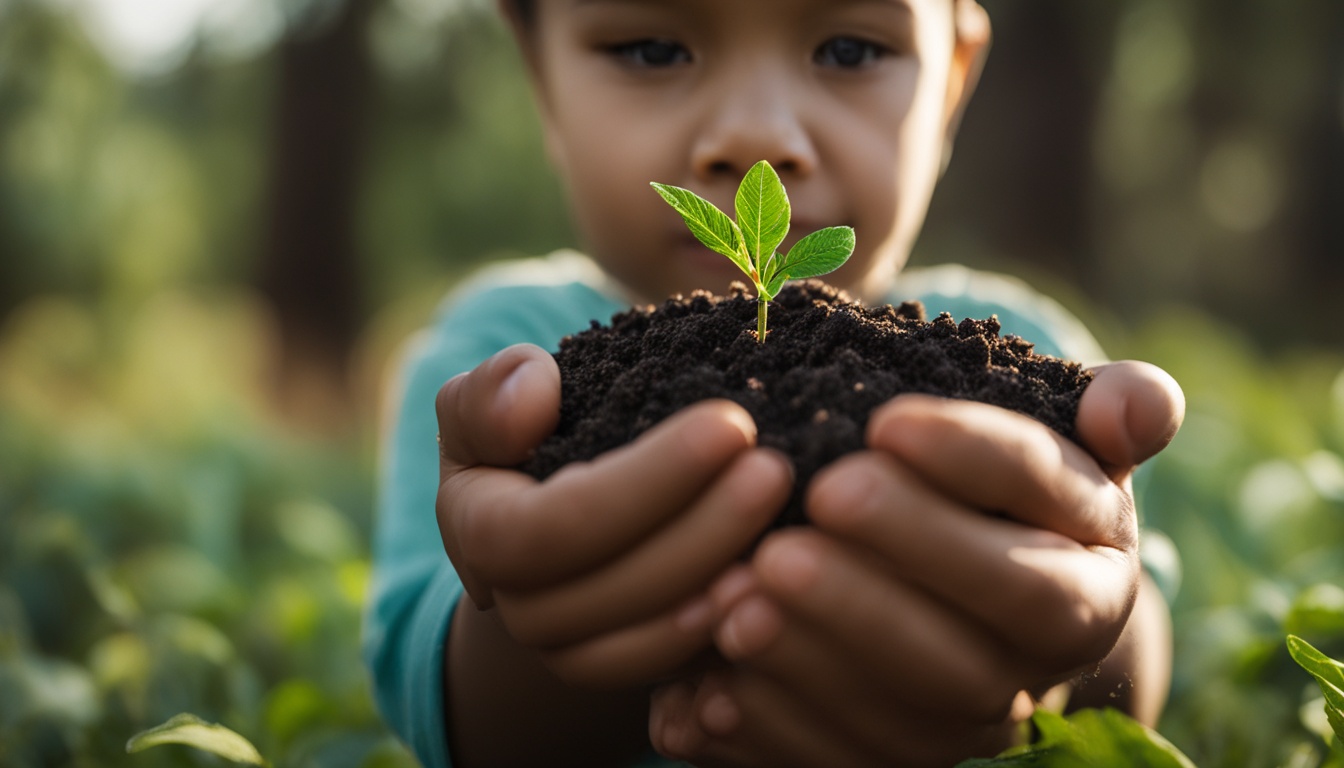Imagine a world where our children feel connected to their communities. They know their civic duties and feel responsible towards society. As parents, teaching kids about civic responsibility is a big part of our job.
This means more than just volunteering now and then. It’s about making civic duty a part of everyday life. Seeing your child respect others and understand governance makes you proud. These actions show they’re responsible citizens and help build their self-esteem.
Some stats are worrying—only a quarter of Americans know the three branches of government. Social interactions and civic engagement have dropped over time. But, there’s hope. Research from Harvard Kennedy School and Tufts University links civic engagement to happiness and a better life.
Children who volunteer do better in school and feel good about themselves. Parents who get involved in community activities make a big difference. They inspire their kids to do the same.
Teaching kids about their role in society starts at home. The values we show them shape their future. Let’s work on building a strong civic responsibility in our kids. This way, they’ll be engaged, responsible, and caring citizens.
Key Takeaways
- Teaching kids responsibility boosts their self-esteem and civic knowledge.
- Being active in the community helps kids do better in school and feel good.
- Parents who get involved in civic duties encourage their kids to do the same.
- Less social interaction highlights the need for community involvement.
- Leading by example teaches kids to be independent and connected to society.
The Importance of Civic Responsibility in Child Development
Learning about civic responsibility is key for a child’s growth. Being part of the community helps with important child development steps. It also boosts emotional smarts and helps kids grow into caring citizens.
How Civic Engagement Influences Personal Growth
Studies show kids who help out in their community grow a lot. Activities like volunteering teach them to care and understand others. This builds strong social ties and makes them happier.
Getting kids involved in community issues helps them see what their area needs. This sparks a sense of duty and motivates them to act. It’s a big step in their development.
Building a Foundation for Lifelong Learning
Being civic-minded sets kids up for a lifetime of learning. It boosts their thinking and decision-making skills. This helps them keep growing and getting involved in their community.
Parents are key in teaching kids about civic duty. By showing the value of voting and community talks, they pass on important values. This builds better citizens, tightens family ties, and helps kids do well in school.
| Aspect | Impact on Child Development |
|---|---|
| Civic Engagement | Fosters emotional intelligence, develops social connections, and nurtures a growth mindset in kids. |
| Community Involvement | Encourages understanding of societal needs, responsibility, and action-driven participation. |
| Parental Modeling | Strengthens family bonds, promotes educational achievements, and instills values of active citizenship. |
Positive Role Modeling: Leading by Example
To help your kids feel civic responsibility, be a positive parent and lead by doing right. Show them what it means to be kind, empathetic, and responsible. This is key in molding their behavior and values.
Try community service with your kids. Studies show kids of volunteering parents are 19% more likely to care about civic duties. Also, 75% of kids who see parents volunteering often become active citizens. Only 56% of kids without volunteering parents do the same. This shows how important it is to teach kids about giving back.

Your daily actions affect your child’s behavior too. For example, 64% of kids follow their parents’ healthy eating habits. And kids see their parents handling emotions well, they’re 22% more likely to manage their feelings better.
Being kind, empathetic, and having healthy relationships teaches your kids to be the same. Research says 80% of kids copy their parents’ social skills. Also, teaching kids respect for different views helps build a more accepting world.
The “Real World Peaceful Parenting” podcast talks about being a good role model. It gives tips to make homes more peaceful. Parents are asked to think about their actions. Questions like “Do you model joy?” help parents improve their parenting.
As a parent, you greatly shape your child’s life. Show them what civic behavior looks like. By being a positive role model and setting clear boundaries, you teach them important values through your actions.
Promoting Open Communication at Home
Open communication is key to raising kids who care about society. Talking with your kids is vital for a trusting home. By controlling screen time and boosting creativity, parents can have deep talks with their kids. This helps kids share their thoughts freely.

Encouraging Active Listening
Listening well is a big part of talking effectively. When parents really care about what their kids say, kids are more likely to share. Looking at your child and not getting distracted shows you’re really listening.
Activities like asking open questions and talking together help everyone understand better. They also make kids think more deeply.
Questions like “What was the best part of your day?” get better answers than simple “yes” or “no.” Short, focused talks are easier for young kids to follow.
Discussing Current Events with Children
Talking about tough topics, like news, helps kids see the world clearly. It lets them hear different views and think for themselves. Start by sharing your thoughts and listen to theirs, making sure everyone gets a say.
Adding creativity to these talks works well. For example, drawing about a news story makes it fun and real. Also, limiting screen time opens up deeper talks, giving kids a balanced view of things.
Regular, open parent-child communication makes kids feel important and understood. This builds a strong base for learning and being responsible citizens.
Fostering Critical Thinking and Decision-Making Skills

Encouraging kids to ask questions and explore is key to independence. They naturally question everything and love to take risks. This curiosity lays a strong base for critical thinking in children.
Creating a culture of curiosity boosts their decision-making skills and problem-solving abilities. With AI, social media, and endless info, it’s vital for kids to learn to analyze info well. Using conscious parenting that builds trust and open talks works better than strict methods that control and punish. This approach can stop critical thinking from growing.
Studies by Michigan State University Extension show that critical thinking exercises help kids grow. Letting your child follow their interests and test theories leads to deeper engagement and analysis.
Critical thinking is key for doing well in school and work, and for good communication and relationships. Ellen Galinsky’s book highlights these skills as crucial for kids. Parents must make an effort to help develop these skills, which takes thought and intention.
Too much screen time can be a trap, taking away from activities that build critical thinking. Instead, let your child explore their interests and ask questions to boost their thinking skills.
Creating a space where kids feel safe to share their views and help make decisions teaches them about complex ideas and making informed choices. These skills are essential for raising responsible, independent people who can handle civic duties well.
| Parenting Practice | Impact on Critical Thinking |
|---|---|
| Conscious Parenting | Fosters an environment of trust, encourages exploration and questioning, enhances problem-solving skills. |
| Authoritarian Parenting | Focuses on control and punishment, potentially stifles curiosity and critical thinking development. |
| Encouraging Curiosity | Promotes engagement and opportunities for critical thinking and analysis. |
| Excessive Screen Time | Detracts from interactive activities that build decision-making and critical thinking skills. |
| Promoting Interests | Leads to more active engagement and analytical thinking. |
Encouraging Independence through Age-Appropriate Responsibilities
Teaching kids to be independent is key to their growth. Giving them tasks that fit their age is a great way to do this. These tasks help them learn important life skills and build a sense of responsibility.
Simple Chores and Tasks for Young Children
Kids aged 2 to 5 can start with easy tasks like putting away toys or helping set the table. These jobs teach them gratitude and make them feel good about helping. They also improve their organization, time management, and problem-solving abilities.
Remember, the goal is to make these tasks fun and right for their age.
Building Accountability and Self-Reliance
For kids 6 to 10 years old, you can give them bigger tasks like making their bed, helping with laundry, or yard work. These jobs help them develop a strong work ethic and confidence. They learn to handle things on their own.
Pre-teens (11-13 years) can take on cooking simple meals and managing a budget for groceries. This helps them make better decisions.
Teenagers (14-18 years) can help with organizing the house, taking care of the car, and volunteering. These activities improve their maturity, independence, and sense of social responsibility. Using chore charts and rewards helps them stay on track and accountable.
It’s important to balance these tasks with letting kids enjoy their hobbies. This mix of work and play helps manage tantrums and teaches kids to set boundaries and take care of themselves. These are key skills for the future.
For more on using reward systems, check out the reward systems for toddlers blog.
Integrating Environmental Awareness into Daily Activities
Teaching kids about the environment is key to their future. It helps them make healthy choices and care for our planet. By doing this, you’re setting them up to love and protect our Earth.

Recycling and Waste Reduction
Teaching kids about recycling and reducing waste is crucial. By sorting waste and using less plastic, families can make a big difference. This early learning lays a solid base for caring for the environment.
- Sort recyclables: Paper, plastic, glass, and metals should be properly sorted.
- Reduce waste: Minimize the use of single-use plastics and encourage reusable items.
- Repurpose items: Creative projects using old materials can foster innovation and resourcefulness.
Gardening and Planting Trees
Gardening and planting trees teach kids about nature and their role in it. It’s key for their health and learning about the environment.
- Start a family garden: Grow vegetables and herbs, which helps children understand where food comes from.
- Plant native trees: This supports local wildlife and introduces biodiversity.
- Compost organic waste: Use kitchen scraps to create nutrient-rich soil, enhancing your garden and reducing landfill waste.
Research shows that teaching kids about the environment has big benefits. For example, a review of 66 studies found that young kids learn a lot from environmental education. This is crucial as we face issues like climate change and pollution.
Getting kids involved in recycling and gardening does more than teach them. It prepares them to be caring, informed citizens. By making these activities a daily part of life, you’re helping raise a generation that will care for our planet.
Cultivating Empathy through Community Service
Getting kids involved in community service is a great way to teach them empathy. Activities like volunteering at shelters, helping with food drives, and supporting neighbors show them the difference they can make. These actions are key in teaching kids about different lives and views.

Studies show that kids learn empathy by seeing and experiencing it from their parents. Small acts of kindness, like inviting someone to join in, help raise kind kids. These actions improve social skills and encourage kids to be kind.
When kids care for others, like writing cards or making meals for the sick, they learn about compassion. Talking about empathy helps them see beyond their own world. This broadens their understanding and teaches them to be inclusive.
Research says empathy is key to being ethical, building strong relationships, and succeeding in life. By getting kids involved in community service, we teach them to be compassionate. This helps them deal with different social situations and grow in empathy.
Changing daily questions to focus on kindness and empathy helps kids see things from others’ viewpoints. This approach broadens their understanding and improves their ability to connect with others. Community service is a powerful way to raise kind kids and teach them about social responsibility.
| Activity | Empathy Development |
|---|---|
| Volunteering at Shelters | Witnessing the impact of their help on those in need. |
| Food Drives | Understanding the community’s needs and feeling a part of the solution. |
| Supporting Neighbors | Building a sense of community and trust. |
These community activities build a strong base for kids’ social skills and empathy. They help kids become compassionate and responsible adults.
Teaching Financial Literacy from a Young Age
Teaching kids about money is key to being responsible. Start talking about money early to help them make good financial choices. Use guides like the Money as You Grow guide for age-right talks.
Every child is different, so their allowance should match your family’s needs. This way, they learn the value of managing money and budgeting.
Involve your kids in real money decisions to help them learn. A give-save-spend bank teaches them about saving. Start a charity jar to teach them about giving back and being responsible with money.
Opening a bank account for kids prepares them for the future. It gives them a chance to handle their money directly.
Jen Hemphill, from the Her Dinero Matters podcast, says being open about money with kids is vital. It’s okay to start teaching them even if you’re not sure about money matters. High schoolers need to learn about budgeting and saving as they start earning.
Talk to them about saving for college and the costs of big purchases. This helps them make smart choices and be financially responsible.
Teaching kids about money takes ongoing effort and adjusting to their needs. For more tips on connecting with your child and their unique financial journey, check out here.
FAQ
How can parenting and raising kids instill a sense of civic responsibility?
What role does teaching kids responsibility play in fostering civic responsibility?
How does fostering child independence contribute to building self-esteem in children?
How does civic engagement influence a child’s personal growth?
What is the connection between child development milestones and civic responsibility?
How does positive parenting model civic behavior?
How can parents promote open communication to enhance civic responsibility?
What are some effective ways to foster critical thinking and decision-making skills in children?
How can simple chores and tasks build accountability and self-reliance?
Why is recycling and waste reduction important for instilling civic responsibility?
How does community service cultivate empathy in children?
What are some ways to teach financial literacy to kids?
This post contains affiliate links. If you click on a link and make a purchase, I may earn a small commission — at no extra cost to you. Thank you for supporting this blog and helping me keep the patterns free! Read the full Affiliate Disclosure & Transparency.
